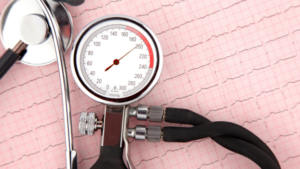In the United States, 45 percent of adults have hypertension. This is the equivalent of almost 108 million individuals.¹ Because having hypertension can put an individual at an increased risk for heart disease and stroke, it is imperative to understand proper management of the disease, as well as contributing factors that have the potential to worsen the severity of this condition. With many factors impacting hypertension, this guide will focus on how behavioral health specifically can affect both the development and management of the chronic condition.
Behavioral Health Overview:
Behavioral health encompasses different aspects of an individual’s life which are associated with the health and well-being of the mind, body, and spirit. As such, a wide spectrum of lifestyle attributes are included in the term. Different organizations who have looked closer into behavioral health focus on specific aspects in order to narrow down the broad field when looking at results.
Some examples of what can be included in behavioral health are: eating habits, alcohol consumption, exercise regimen, mental health, psychiatric health, marriage and family counseling, addiction treatment, and more. Behavioral health includes prevention, intervention, treatment, and recovery support services, which is why the field is so vast.²
As behavioral health encompasses a great proportion of an individual’s life, it is important to understand how it could impact a person’s medical conditions. Poor behavioral health could affect different aspects of a patient’s medication regimen, such as medication adherence. On the flip side, if a patient is diagnosed with a certain medical condition, their behavioral health could begin to decline. Understanding behavioral health and the influence it has on a patient’s life allows clinicians to adequately treat patients.
Impact of Behavioral Health on Hypertension:
Studies have shown that there is a direct correlation between behavioral health and hypertension.
In 2014, 400 hypertensive patients across two hospitals participated in a pilot study to assess how the symptoms of behavioral health— anxiety, depression, and stress— affected medication adherence. Data was collected from the patients regarding their age, sex, place of residence, religious affiliation, marital status, educational level, and the duration of their hypertensive diagnosis.
From here, patients completed various quantitative assessments to collect patient data. The assessment tools utilized included:
- The Depression Anxiety Stress Scale – DASS
- Measures the negative emotional states of depression, anxiety, and stress.
- Morisky Medication Adherence Scale
- Measures medication adherence behavior in hypertensive patients.
- Spiritual Perspective Scale
- Measures the belief perceptions of participants relating to spiritually-related interactions.
At the end of the study, the data showed patients with hypertension manifested symptoms of anxiety, depression, and stress which implies that the patient’s hypertensive state, and perhaps the need for adherence with their medications, placed psychological demands on their health.
The patients who were stressed were more likely to be non-adherent than those who had no or low stress levels. This demonstrates it’s possible that patients showing stress symptoms may be more susceptible to the negative effects of their medications and may discontinue taking them.³
This study highlights the critical need for clinicians to pay attention to a patient’s behavioral health and the role it can play in medication adherence. An understanding of this intersection could help patients better manage both their behavioral health and hypertension.
Another study conducted in 2018 echoed this sentiment where 488 hypertensive patients were measured for anxiety and depression using the self-rating anxiety and depression scales. Cardiovascular health behaviors — smoking, obesity, leisure physical activity (LPA), and fruit and vegetable consumption (FVC) — were assessed using the Cardiovascular Health in Ambulatory Care Research Team index. According to the results, the proportion of patients who tested not ideal in the categories of smoking, obesity, LPA, and FVC were 63.9, 49.8, 30.7, and 78.3 percent respectively. The study found the synergy interaction between obtaining secondary education or less and displaying comorbidity of hyperlipidemia for anxiety, as well as the interaction between not obtaining adequate amounts of physical exercise and having depression were both statistically significant.⁴
This study showcases the importance of paying more attention to the psychological health of hypertensive patients who are more at risk for poor behavioral health.
The effect of behavioral health on hypertension can even be seen in literature publications revolving around psychosocial and behavioral health assessments and interventions in pulmonary hypertension. In a study that performed an integrative systematic review of publications from a variety of scientific journals over the course of ten years, patients with pulmonary hypertension reported psychosocial needs such as financial assistance, social connections, sexual health, and palliative care needs. These patients also displayed signs and symptoms of psychological distress. Patients stated that their needs in behavioral health support were not being met during their hypertension management regimen, as they adjusted to lifestyle changes at each stage of disease progression.⁵
As seen in this study, these patients had high levels of behavioral health needs that required intervention beyond medical treatment. Behavioral health interventions have the potential to redress these unmet needs in order to improve patient hypertension self-management.
How We Can Help:
With certified health coaches who are fully trained in Behavioral Health Integration (BHI), Certintell can help take your telehealth services to the next level. Through the utilization of Remote Patient Monitoring (RPM) to help screen and manage a patient’s chronic conditions, such as hypertension, our health coaches are ready to help patients understand the best interventions and treatments of their disease, as well as the best ways to ensure adherence. Schedule a demo below in a few clicks to learn more.
SOURCES
¹ Centers for Disease Control and Prevention (CDC). “Facts About Hypertension in the United States.” US Department of Health and Human Services. 8 September 2020. https://www.cdc.gov/bloodpressure/facts.htm
² “Behavioral Health vs Mental Health.” Alvernia University. 8 July 2020. https://online.alvernia.edu/program-resources/behavioral-health-vs-mental-health/
³ Kretchy I, Owusu-Daaku F, and Danquah S. “Mental Health in Hypertension: Assessing Symptoms of Anxiety, Depression, and Stress on Anti-Hypertensive Medication Adherence.” International Journal of Mental Health Systems. 21 June 2014. https://ijmhs.biomedcentral.com/articles/10.1186/1752-4458-8-25
⁴ Liu J, Tang W, Yang Y, Luo D, Zeng N, and Liang Y. “Cardiovascular Health Behaviors for Co-Morbid Anxiety and Depression Among Patients with Hypertension.” Research Square. 1 February 2021. DOI: 10.21203/rs.3.rs-273914/v1
⁵ Von Visger T, Lee D, Lyons A, and Chang Y. “Integrated Review of Psychosocial and Behavioral Health Assessments and Interventions in Pulmonary Hypertension.” National Library of Medicine. 1 April 2021. https://pubmed.ncbi.nlm.nih.gov/33630538/
RELATED ARTICLES



